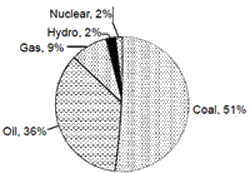NEW! The Gist (FREE) | E-BOOKS |
(IGP) IAS Pre: GS - Data Interpretation And Data Sufficiency - Introduction to Data Interpretation
Introduction to
Data Interpretation
Data Interpretation
Bureaucrats and Government executives must face lots of facts and figures in everyday business. Normally these facts are presented in more compact and precise forms such as
1. Tables (known as data tables)
2. Charts (Pie, Bar, Pert, etc.)
3. Graphs (2D and 3D)
4. Diagrams (Geometric or Venn diagram)
An Administrator must possess basic skills on deciphering the data from the above mentioned precise forms of tables, charts etc. which enhances his/her administrative efficiency. This ability is known as data interpretation. So IAS Prelim/CSAT exam test the candidates ability of data interpretation.
Example 1
Question: These questions are based on following pie chart, which gives the details of percentage of energy source of India.

Q. The second largest energy source of India is
(a) Coal
(b) Oil
(c) Gas
(d) Hydro and Nuclear
Ans: b
Note: Question may not be always direct. You may need to compute answers before arriving conclusion. Look the example below.
Example 2
Question: These questions are based on following table, which gives the details of Distribution of paper industry in India during 1997 especially state wise no of mills, its production capacity in thousand metric ton and Percentage of mills of all India it possess
| State | No. of Mills | Production Capacity (in ‘000 MT) | Percentage of all India |
|---|---|---|---|
| Maharashtra | 63 | 624 | 16.52 |
| Andhra Pradesh | 19 | 427 | 11.3 |
| Gujarat | 55 | 369 | 9.77 |
| Uttar Pradesh | 68 | 336 | 8.89 |
| All India (Total) | 379 | 3778 | 100 |
Q. Which of the state has lowest productivity with respect to number of mills it possesses?
(a) Maharashtra (10.19)
(b) Andhra Pradesh (22.47)
(c) Gujarat (6.71)
(d) Uttar Pradesh (4.94)
Ans: d
Note: Also there may be few questions unable to interpret using available chart or tables. It needs careful attention however it is very easy.
Quest ion Pat terns of Data Interpretation
There are a multiple ways in which data can be shown to you. They are various forms of tables, charts, bars, diagrams. For UPSC-CSAT, 2011, you can expect Data Interpretation questions on singular bar, multiple bars, tables, pie chart, line diagram etc. There you will be provided certain data and instructions. On the basis of the instructions you have, you have to answer the questions asked to you, along with the data.
Ways to Prepare for Data Interpretation
For interpreting data, you should read a lot. Read lot of business reports and the analysis given with the presentation of data. This will give you a fair idea on how data are presented and how to interpret or analyze them. You must read articles, especially on business which are heavy on data and analyze them. This will keep your ‘DI cells’ on toes. In a similar note, Refer to the graphs and data provided in various business papers and magazines. You need to identify techniques to solve questions which require big and time consuming calculations.
At this stage, when there are few months left for UPSC- CSAT, 2011 you should solve at least three to four Data Interpretation sets every day. Also, you need to be good with quick calculation of ratios, percentages, etc. With consistent practice, you will be able to achieve the same
While Solving Data Interpretation Quest ions
While solving the Data Interpretation questions, you must keep some points in mind. Experts suggest the following points which you should keep in mind while you start attempting the Data Interpretation questions
- Read the title carefully
- Take your time and read both the questions and data set carefully. Understand what you are being asked to do before you begin figuring out the information.
- Check the data and types of information required. Be sure that you are looking at the right part of graph or chart, i.e., on paper columns or rows or proper lines.
- Read the parameters listed along with axes and the scale. This is the most important points as generally one assumes standard scale as 1 unit = 100 or 1 unit = 10. Also the scales of two axes might be different.
- The footnotes give the additional information for particular data. This also explains the jargons and lists the formulae that might be needed to solve the questions asked.
- Check the units required. Be sure that your answer is in thousand, millions or whatever it is that the question specifies.
© UPSCPORTAL.COM

